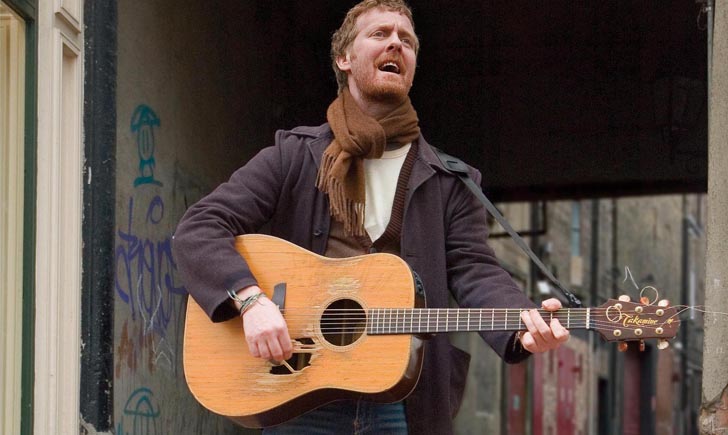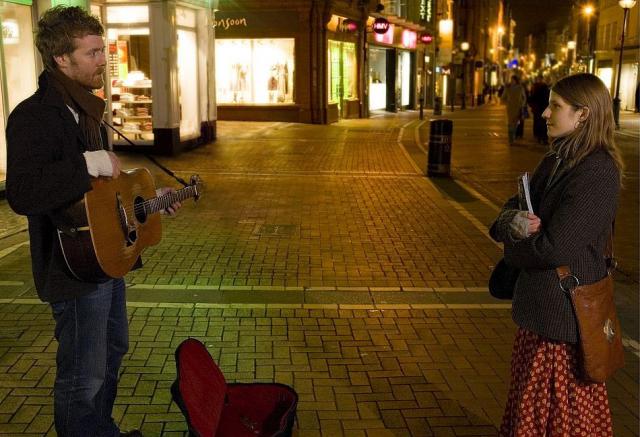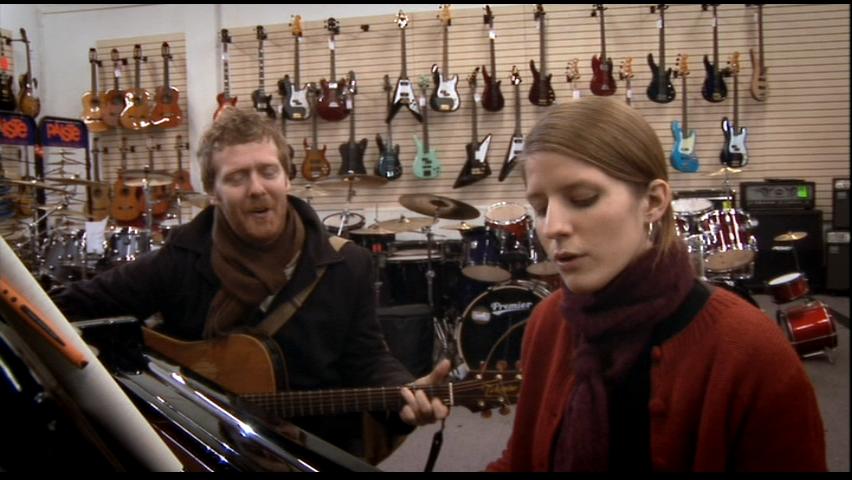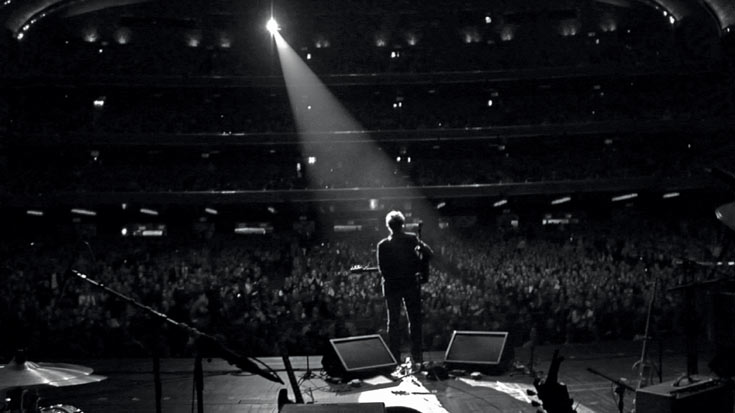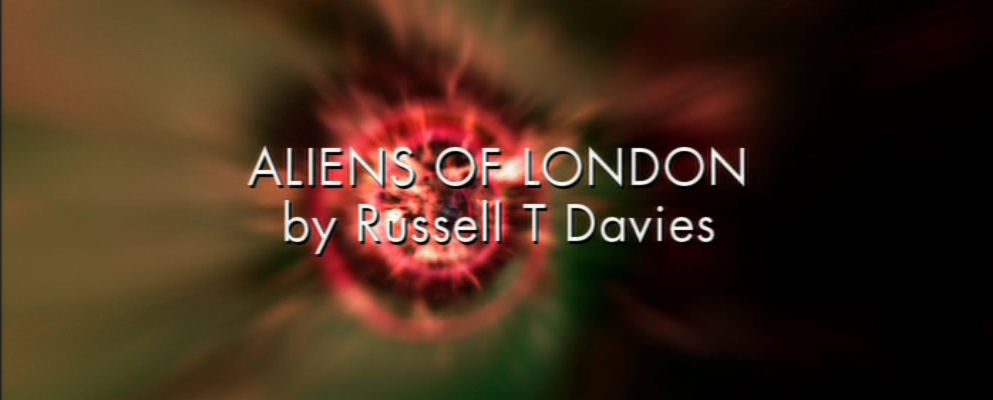“Music… will help dissolve your perplexities and purify your character and sensibilities, and in time of care and sorrow, will keep a fountain of joy alive in you.” –Dietrich Bonhoeffer
A guy stands busking on a crowded street, guitar in hand, belting out a tune. Hundreds of people pass by in the business of the day. A few stop for a moment, sing a long to the familiar tune he has chosen, and drop a coin into the guitar case at his feet before moving on.
This image begins the journey of the film Once. The small, independent 2007 film caught fire internationally in part based on the strength of the music created by its two stars- Glen Hansard and Marketa Irglova, who formed the group The Swell Season not long before making the film. I became a fan of their music after the film as many did, and despite the impact the film and their music had on me, I realized I had only seen the film once (pun not intended). Upon my second viewing, I was surprised to discover so much more lying under the surface of what appears to be a very straightforward story.
It’s easy to say this is a movie about the power of music. In one sense that is true. But more specifically the film portrays what it is that makes music so powerful and why we need it. I am a musician, and as such I felt that this was something I just inherently understood. I was a little shocked to find out after digging into this film that I didn’t fully see it, even though Once portrays it in plain view.
The story is simple. After Guy meets Girl while busking on the street, they each begin to come to terms with their individual places in life through the friendship they develop while playing music together. We do not learn their names, instead letting them represent two sides of the story ambiguously, metaphorically. So, Guy and Girl are shades of the grey in all our lives and their individual songs join together to color their world for a moment.
Once is a love story. But it is not a Guy meets Girl and they live happily ever after love story. Guy does meet Girl, but it is their relationship and mutual love of music that allows them to live, ever after. Happiness is left to the ether at the end of the film. Much more importantly, it is joy that they find together.
“Your joy is your sorrow unmasked. And the selfsame well from which your laughter rises was oftentimes filled with your tears. And how else can it be? The deeper that sorrow carves into your being, the more joy you can contain.” –Kahlil Gibran
Guy and Girl, like us all, have experienced deep heartache. Their sorrow is new and lingering. And it has carved into them deep wells eager to be filled with joy. We see that they are unable to fill them on their own. Even music alone cannot fill them. Hundreds of people surround Guy as he busks on the street, yet he is utterly alone. He sings because he doesn’t know what else to do. He strums his guitar because really it is just another part of him. But nothing changes within him. He is stuck and is crying out with his music for a true response.
Later on the same night that begins the film, he plays an original song written from his heart while he is seemingly alone on the dark street. Girl answers back, clapping for him before prying into the meaning of his lyrics. He doesn’t want to let her in at first, almost annoyed by her prodding at his heart. But when he relents, their journey begins.
They share with each other their stories through song and their relationship blooms. They find joy by singing their sorrows. The guy strikes the guitar, the girl accompanies on piano, and the fountain springs up. And it isn’t a fountain of happiness. The problems of their life don’t go away after the songs are sung. But their wells begin to be filled and they are able to cope with their situation, having gained a footing that allows them to begin to move forward.
There’s a moment in the middle of the film where Guy and Girl end up at a dinner party. Dozens of people are gathered in a crowded flat sharing a meal together. The evening is warm, familial, and eclectic. Community is alive on the screen. As the meal ends, the group engages in time of song-sharing, singing folk tunes they seem to have known since childhood that have surely been sung many times over by their drunk uncles or nostalgic grandmothers.
The moment culminates in a group song where the crowd, with bellies full of food and alcohol, sings along to a love song. It is here where we see the unifying power of music most potently on display. We all have a song to share- of pain or of love, of sorrow or joy. And as Guy and Girl come to discover, sometimes our songs need to be sung together in order for them to truly speak.
As a musician, I feel that playing music for me is a necessity. Because of that, it can feel very much like a singular experience at times. When performing, I have often viewed it as a momentary intrusion- myself the busker on the street, thankful for a few coins- worth of a listener’s time.
Recently, however, I heard a perspective from a friend of mine on the relation of the audience to the musician. She believed that listening to someone play music is one of the most self-less things one can do because, as she said, you are momentarily allowing another person’s voice to be louder than your own for a moment.
I had never seen it that way before. But that’s the power of music. Melodies can crowd out your own conscience, sometimes better than other mediums can. Being separated from that voice, if only for a moment, can be a catalyst to allow someone to reach into your life and begin filling the wells of sorrow with the refreshing waters of joy.
“You have turned for me my mourning into dancing; you have loosed my sackcloth and clothed me with gladness 12. that my glory may sing your praise and not be silent. O Lord, my God, I will give thanks to you forever!” -Psalm 30:11-12
Seeing the power of music illustrated in this way also had a profound affect on me in relation to worship. Perhaps the first time I saw the film it was subconscious, as the music of Glen and Marketa in the Swell Season helped open me up to an array of emotional expression. Upon this viewing, though, I was able to come to a more complete understanding of its impact
I believe that my ultimate joy comes from God. So if I take a moment to sing about the truth of my creator, the music will speak louder than my doubts and fears, my anger and disappointments. With my own conscience drowned out in a song of worship, God’s pure joy will fill even my deepest caverns of sorrow to the brim.
Many have said, “When words fail, music speaks.” But the power of music doesn’t lie in the chords and melodies alone. It is when we allow someone else to speak through it that it can change our lives. No matter how briefly we experience it, all it takes is the first tap of your foot to the beat to begin the steps away from mourning to dancing.

